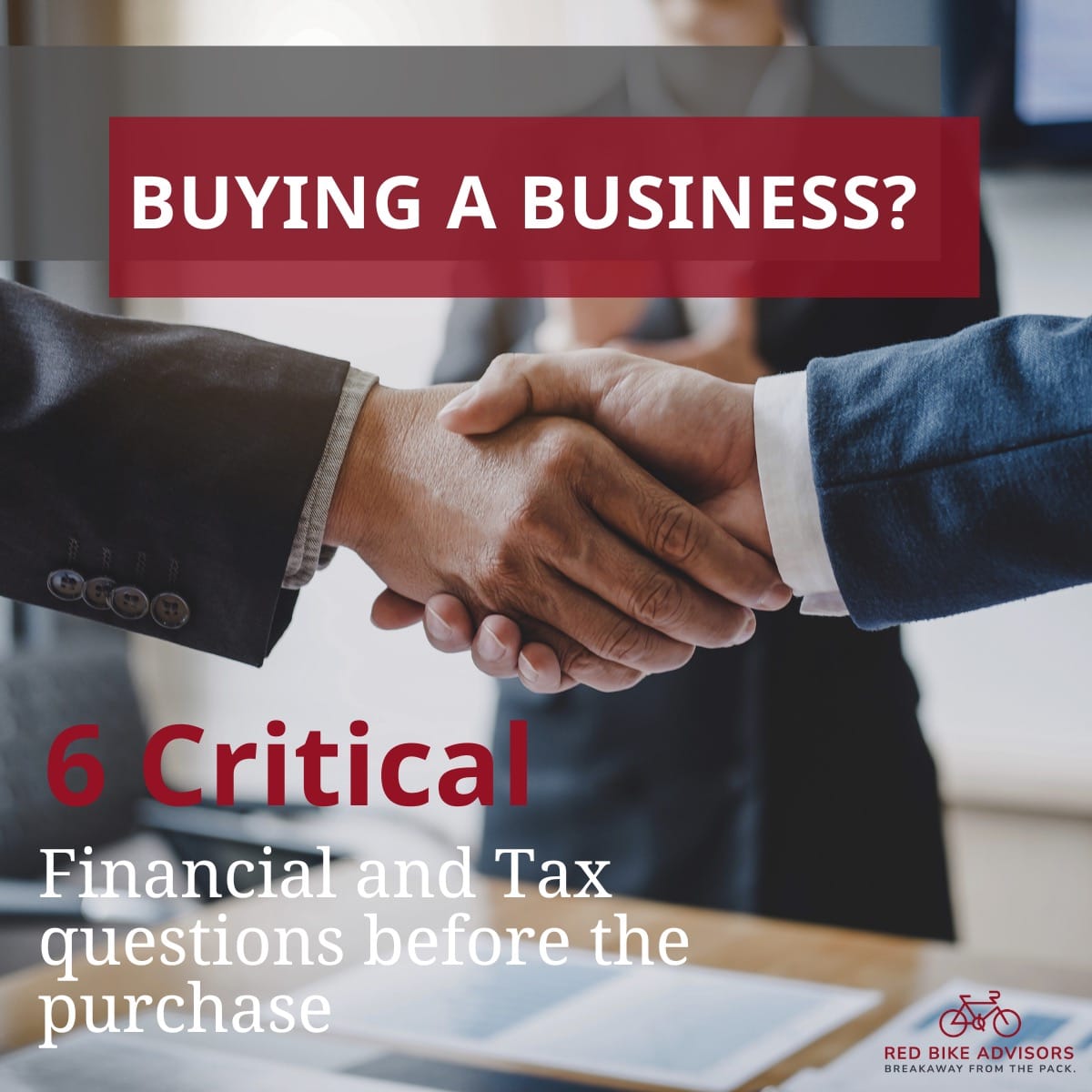
Buying a Business? 6 Critical Finance and Tax Questions Before the Purchase

By Gretchen Roberts

As Baby Boomers continue to retire, business-buying is a hot opportunity for new entrepreneurs and existing business owners alike. Before you ink your first (or next) deal, ask these questions and get clear answers that help you decide to move forward, renegotiate, or walk away.
1. Are the financials up-to-date, clean, and clear?
Larger companies generally have audited financials that have been scrutinized by a CPA, but often “Main Street” small business transactions involve pretty messy books. We’ve seen it all, from unreconciled accounts to personal expenses to mismatched books and tax return figures.
Most seller’s brokers will create a pro forma financial statement that pulls out personal and one-time expenses to increase SDE, or seller’s discretionary earnings, in order to increase the perceived value and purchase price. Don’t take pro forma financials at face value. They’re useful at a quick glance to see if you want to pursue a deal, but you need to do your own financial due diligence.
Financial due diligence may include a review of the financials and payroll records, assessment of the SDE or EBITDA (essentially, is the profit what the seller is claiming it is?), and any potential financial risks, inaccuracies, or areas of non-compliance.
2. Will I have enough working capital?
Working capital analysis is an assessment of the business’s liquidity in order to pay pressing obligations. An analysis will look at accounts payable, accrued liabilities, accounts receivable, inventory turnover, and other items to understand the timing of cash flows in and out of the company.
In other words, does the company have enough cash to pay its bills at different time periods?
You can use the seller’s assessment of working capital as a starting point, while keeping in mind that several of the inputs will likely shift upon acquisition.
3. Is the deal structure tax-advantageous?
There are quite a few elements to deal structuring beyond the scope of this article, but there are ways to structure the acquisition that are tax-advantageous to the buyer and/or seller. You need to be aware of these in order to structure the offer so it’s advantageous to you, or to use the information as a negotiating tool for leverage on price or other terms.
4. Am I forming the right entity or entities for the purchase?
Entity structuring should be a joint effort with your attorney and tax advisor. Attorneys are typically looking to mitigate risk, and accountants are looking to minimize tax liability and unnecessary complexity.
Often buyers will come to us with an overly complex structure and don’t realize how much more compliance (tax filing, intercompany bookkeeping, reporting, etc.) will cost on an ongoing basis.
5. Do I have a solid post-close budget?
Whether or not your lender requires it, you should prioritize a dialed-in post-close budget that forecasts revenue, profit, and debt coverage. You should also account for unexpected expenses and price increases that inevitably come up following the acquisition.
We recommend running additional “bear” and “bull” scenarios that forecast target revenue growth and a worst-case scenario.
6. Do I have the right accounting and tax support post-close?
Whether you’re acquiring your first company or your fifth, the stakes are higher if you’ve got a loan and/or investors you’re accountable to.
Start the business off on the right financial footing with accurate, up-to-date books, worry-free tax compliance, and strategic finance and tax advisory that helps you keep more profit in your pocket.
From pre-close financial due diligence and entity advisory, to post-acquisition bookkeeping & accounting, tax strategy & filing, and financial advisory, we’re on a mission to help you create exponential value in your business.